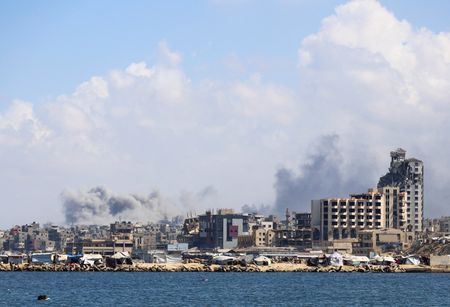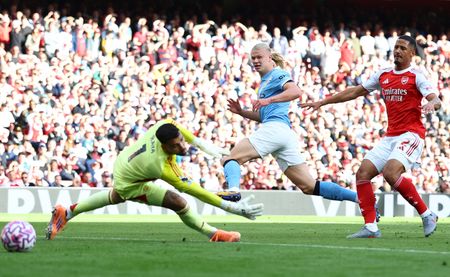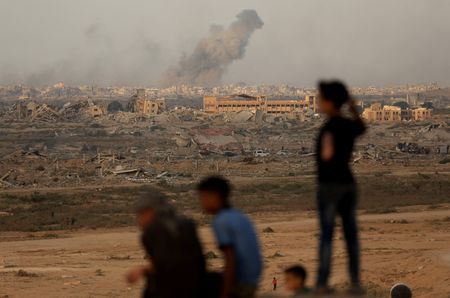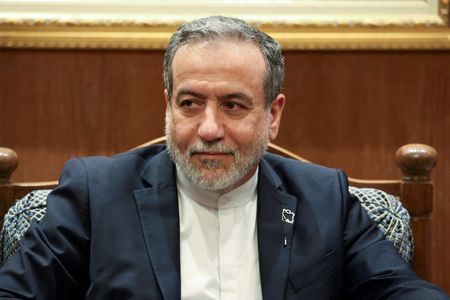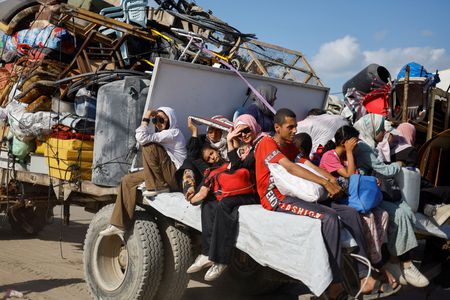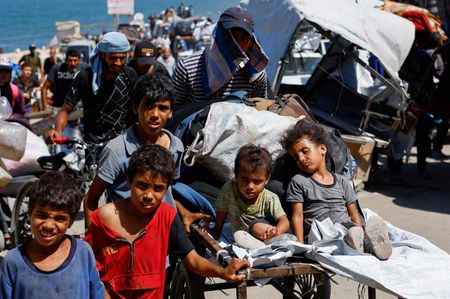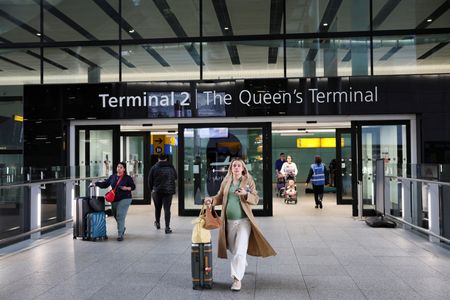(Reuters) -Britain, Canada and Australia all recognised a Palestinian state on Sunday, with other countries expected to follow suit this week at the United Nations General Assembly in New York.
What would that mean for the Palestinians and Israel?
WHAT IS THE STATUS OF PALESTINIAN STATEHOOD NOW?
The Palestine Liberation Organization declared an independent Palestinian state in 1988, and most of the global South quickly recognised it. Today, about 150 of the 193 U.N. member states have done so.
Israel’s main ally, the United States, has long said it supports the goal of a Palestinian state, but only after the Palestinians agree with Israel on a two-state solution. Until recent weeks, the major European powers shared this position.
However, no such negotiations have been held since 2014, and Israeli Prime Minister Benjamin Netanyahu has now said there will never be a Palestinian state.
A delegation representing the State of Palestine has observer status at the United Nations – but no voting rights. No matter how many countries recognise Palestinian independence, full U.N. membership would require approval by the Security Council, where Washington has a veto.
Palestinian diplomatic missions worldwide are controlled by the Palestinian Authority, which is recognised internationally as representing the Palestinian people.
The PA, led by President Mahmoud Abbas, exercises limited self-rule in parts of the Israeli-occupied West Bank under agreements with Israel. It issues Palestinian passports and runs the Palestinian health and education systems.
The Gaza Strip has been administered by the Hamas militant group since 2007, when it drove out Abbas’s Fatah movement after a brief civil war.
Most major powers, with the exception of the U.S. since President Donald Trump moved its embassy to Jerusalem, have their main diplomatic missions in Tel Aviv because they do not recognise Jerusalem as Israel’s capital.
However, about 40 have consular offices in Ramallah in the West Bank, or in East Jerusalem – an area whose annexation by Israel is not internationally recognised and which the Palestinians want as their capital.
They include China, Russia, Japan, Germany, Canada, Denmark, Egypt, Jordan, Tunisia and South Africa.
Countries planning to recognise a Palestinian state have not said what difference that would make to their diplomatic representation.
WHAT IS THE AIM OF RECOGNISING A PALESTINIAN STATE?
Britain, Canada and Australia have recognised a Palestinian state ahead of the U.N. General Assembly this month. Other countries, including France and Belgium, said they would follow suit.
Countries such as Britain say recognition of a Palestinian state is intended to put pressure on Israel to end its devastating assault on Gaza, curtail the building of new Jewish settlements in the occupied West Bank and recommit to a peace process with the Palestinians.
French President Emmanuel Macron, the first leader of a major Western power to endorse recognition, said the move would be accompanied by a commitment by the PA to enact reforms, which would improve Palestinian governance and make it a more credible partner for the post-war administration of Gaza.
WHAT HAS RECOGNITION MEANT IN PRACTICE?
Those who see recognition as a mere gesture point to the limited influence in the conflict of countries such as China, India, Russia and many Arab states that recognised Palestinian independence decades ago.
Without a full seat at the U.N. or control of its own borders, the PA has only limited ability to conduct bilateral relations.
Israel restricts access for goods, investment and educational or cultural exchanges. There are no Palestinian airports. The landlocked West Bank can be reached only through Israel or through the Israeli-controlled border with Jordan, and Israel controls all access to the Gaza Strip.
Still, countries planning recognition and the PA itself say it would be more than an empty gesture.
Husam Zomlot, head of the Palestinian mission to the UK, said it could lead to partnerships between entities on an equal footing.
It might also force countries to review aspects of their relationships with Israel, said Vincent Fean, a former British diplomat in Jerusalem.
In Britain’s case, this might result in banning products that come from Israeli settlements in occupied Palestinian territories, he said, even though the practical impact on the Israeli economy would be minimal.
HOW HAVE ISRAEL AND THE UNITED STATES REACTED?
Israel, facing a global outcry over its conduct in the Gaza war, says recognition rewards Hamas for the attacks on Israel that precipitated the war in October 2023. “A Palestinian state will not be established west of the Jordan River,” Prime Minister Benjamin Netanyahu said.
The United States opposes the recognition moves by its European allies. It has imposed sanctions on Palestinian officials, including blocking Abbas and other PA figures from attending the U.N. General Assembly by denying and revoking visas.
(Reporting by Kate Holton in London, Mohamed Ezz and Alexander Dziadosz in Cairo, James Pomfret in Beijing Ahmed Rasheed in Baghdad, Ali Sawafta in Ramallah and Nidal al-Mughrabi in Gaza;Writing by Michael Georgy;Editing by Peter Graff, Kevin Liffey and Ros Russell)

